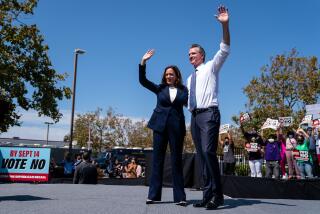Al Who? Gore’s Uphill Road
- Share via
WASHINGTON — Former Vice President Al Gore’s lurch into what he called “the national debate” is based on two flimsy premises. The first is that there is such a debate, and the second is that he has the political standing to take part.
The whole notion of a national debate suggests two sides of some reasonably equal heft, with some kind of jury of Americans weighing one issue against the other. At the moment, however, President Bush dominates the political discussion to the point that Democratic leaders in Congress can do no more than quibble about the particulars of a few domestic issues. That situation is likely to change as the memories of Sept. 11 fade, but not until several months into this election year at the earliest.
Whatever the nature and timing of the national dialogue, however, there is no reason to believe the former vice president is a relevant player. His position as a potential presidential candidate in 2004 rests almost entirely on the reluctance--perhaps inability--of both Democratic Party leaders and the press to speak frankly about his standing.
The broad and pervasive consensus in the political community today is that Gore is finished as a national candidate. While Republicans lick their chops at the thought of a Gore candidacy, there is not a single Democrat of any national prominence publicly supporting him for the 2004 presidential nomination. Privately he is faring even worse. As a Californian who raised serious money for Gore’s 2000 campaign said, “I can’t say this out loud, but I’ve been there, done that.” Asked about organized labor’s attitude toward Gore this time, an AFL-CIO official replied, “Al Who?” Big labor is absolutely critical to any Gore campaign. And John Sweeney, president of the AFL-CIO, has said privately--and repeatedly--that his organization will not repeat the mistake it made in the 2000 campaign when labor’s early endorsement was critical to Gore’s triumph over former New Jersey Sen. Bill Bradley in the pivotal Iowa presidential caucuses.
Yet Gore continues to figure prominently in the speculation on 2004. Why? Because public opinion polls show him leading the Democratic field. Both the politicians and the press know those polls are essentially meaningless. Most Americans pay far too little attention to public affairs to be able to identify a John Kerry or a Tom Daschle, even if they retain some vague notion of who Gore is. But neither the news organizations who pay for the polls nor the political leaders who follow them are willing to say they are based on sand.
Gore cannot be a serious contender because he committed the one unpardonable sin in politics: He lost an election he should have won. Easily. He was a de facto incumbent running on a strong record of eight years against an awkward and inarticulate Republican with thin credentials at best. It should have been a boat ride.
There is some lingering sympathy for the former vice president. After all, Bill Clinton didn’t make things easy for him. And Gore did carry the popular vote. He lost several states only because Ralph Nader and his Green Party decided there was no difference between the Republicans and Democrats and ran an ego-trip candidacy. It took a combination of Nader and a political U.S. Supreme Court ruling to deny Gore the state of Florida and the White House. But the sorry fact remains that he lost his home state of Tennessee.
There may have been strategic and tactical mistakes--should Clinton, say, have been utilized more effectively?--but the core of the problem was the candidate. He changed his shirts and his persona so often that, as the campaign came to an end, many Americans didn’t feel comfortable with him. His campaign was too contrived and mechanical; there was no one willing to walk through a wall for him.
Nor has Gore’s behavior since the election been comforting. He was clearly entitled to a European respite, but he could have shed the beard before coming back. Instead, he continues to wear it in what is being interpreted as a signal of another “new” Gore, this time a laid-back model. What political professionals see here is evidence that the flaws that cost him the 2000 election he should have won were not the kind of flaws that can be corrected. He can talk about “mending fences” in Tennessee, an obvious first step toward 2004. But he cannot shed the image of the contrived candidate too controlled to be human.
It is always possible, of course, for Gore to overcome all these obstacles. After all, Richard M. Nixon won the presidency in 1968 after losing both the 1960 presidential election and the California gubernatorial election two years later. And Nixon was even less able to incite the passions of the street. Talk about controlled and contrived, he retired the cup.
At this point, nonetheless, writing a Democratic Party scenario for 2004 starring Al Gore is a stretch, a long stretch.
More to Read
Get the L.A. Times Politics newsletter
Deeply reported insights into legislation, politics and policy from Sacramento, Washington and beyond. In your inbox twice per week.
You may occasionally receive promotional content from the Los Angeles Times.










